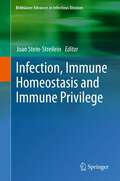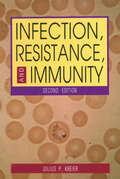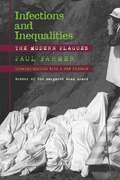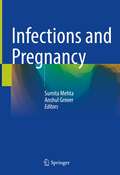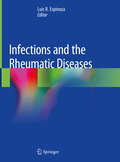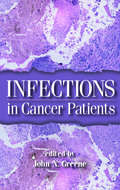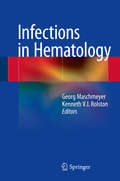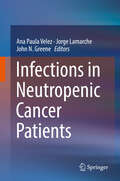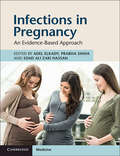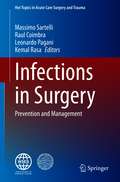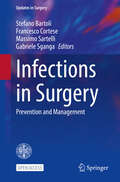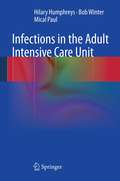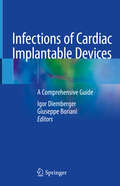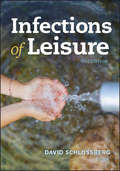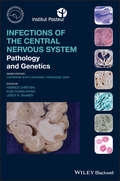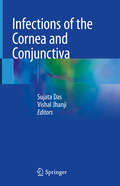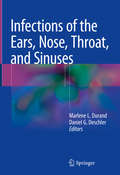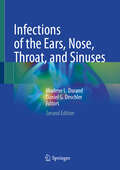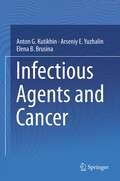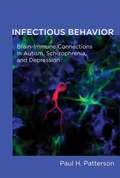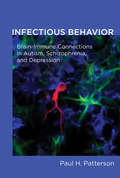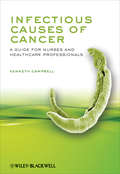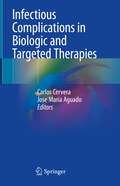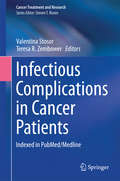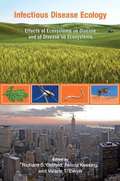- Table View
- List View
Infection, Immune Homeostasis and Immune Privilege
by Joan Stein-StreileinOrgans and tissues that can tolerate little or no inflammation have developed multiple overlapping mechanisms of immune protection in the absence of inflammation. These areas have been designated "immune-privileged sites" by Peter Medawar and include the central nervous system, eye, reproductive tract, testis and possibly the liver. Mechanisms of immune homeostasis found in less immune-regulated organs are often evident in the immune privileged sites and vice versa. It is important that the non-inflammatory mechanisms that contribute to immune privilege allow host defense against infectious organisms. This volume highlights the mechanisms leading to immune privilege in tissues and organs, the deviation of immune responses and the modification of the behavior of the immune cells that manage to cross the blood barriers of tissues, in the context of infection.
Infection, Resistance, and Immunity, Second Edition
by Julius KreierDesigned as an introductory textbook, Infection, Resistance and Immunity provides basic information on the workings of the immunological system and on infectious processes and their control. With sections on immunological disorders, immunization, immunodiagnosis, and epidemiology, it relates immunology to practical problems in medicine. The book includes a section on comparative immunology, introducing students to differences among immunological systems among common species of nonhuman animals. Written for the advanced undergraduate, the focus is on host-parasite interactions—distinguishing this text from other standard texts, which focus on the cellular mechanisms of the immune response.
Infections and Inequalities
by Paul FarmerPaul Farmer has battled AIDS in rural Haiti and deadly strains of drug-resistant tuberculosis in the slums of Peru. A physician-anthropologist with more than fifteen years in the field, Farmer writes from the front lines of the war against these modern plagues and shows why, even more than those of history, they target the poor. This "peculiarly modern inequality" that permeates AIDS, TB, malaria, and typhoid in the modern world, and that feeds emerging (or re-emerging) infectious diseases such as Ebola and cholera, is laid bare in Farmer's harrowing stories of sickness and suffering. Challenging the accepted methodologies of epidemiology and international health, he points out that most current explanatory strategies, from "cost-effectiveness" to patient "noncompliance," inevitably lead to blaming the victims. In reality, larger forces, global as well as local, determine why some people are sick and others are shielded from risk. Yet this moving account is far from a hopeless inventory of insoluble problems. Farmer writes of what can be done in the face of seemingly overwhelming odds, by physicians determined to treat those in need. Infections and Inequalities weds meticulous scholarship with a passion for solutions--remedies for the plagues of the poor and the social maladies that have sustained them.
Infections and Pregnancy
by Sumita Mehta Anshul GroverThis book is a complete guide to the diagnosis and management of any infectious disease which may affect the mother or the fetus during pregnancy. Pregnancy is a unique condition in which the interplay of endocrine and immune influences leads to altered severity and susceptibility to infectious diseases. These infections, in turn, are a substantial cause of maternal and perinatal morbidity.The book discusses the immunologic, clinical and epidemiologic evidence for altered responses during pregnancy. Several infections have unique consequences in pregnancy. Some infections have vertical transmission, and their management focuses on decreasing perinatal transmission. Others can be transmitted transplacentally and cause congenital infection. While still, other common infections like gastroenteritis, UTI, tuberculosis, leprosy or certain dermatological and oral conditions can cause pregnancy complications. This book discusses all such diseases in detail as well as suggests means for early identification and appropriate treatment for them. A separate chapter adequately covers the novel coronavirus infection associated with management challenges in pregnant women. The book includes dedicated sections on postpartum infections and fetal outcomes associated with maternal infections. It reviews strategies to prevent infection in obstetrics that plays a key role in decreasing the global burden of maternal morbidity and mortality. The book is relevant for practicing obstetricians and gynecologists, post-graduate students of obstetrics and gynecology as well as general practitioners, family medicine specialists, primary health care workers and undergraduate medical students.
Infections and the Rheumatic Diseases (The\clinics)
by Luis R. EspinozaThis book provides a comprehensive and up-to-date review of the basic and clinical aspects of infections and infectious processes that trigger or aggravate a variety of autoimmune and inflammatory musculoskeletal disorders. It delivers a timely update on the interactions between infection and rheumatic diseases in order to provide clinicians with the tools they need for proper diagnosis and treatment.The book is divided into five main sections. The first examines the basic aspects of bacterial infections with a discussion of molecular biology, the microbiome, various types of bacteria that cause infection, and recent advances in biologic therapy. The next section focuses on different forms of viral arthritis including hepatitis arthritis, arthritis associated with alpha viruses, and parvovirus-related arthritis. Subsequent chapters then discuss arthritis caused by mycobacteria, fungi, spirochete, and other miscellaneous arthritides. Following this are various analyzations on reactive arthritis and infection-related rheumatic diseases such as Whipple’s Disease, SAPHO Syndrome, rheumatic fever, and HIV-associated rheumatic manifestations. Finally, the book closes with three chapters on external impacts on infectious diseases such as climate change, vaccinations and systemic lupus erythematosus.Infections and the Rheumatic Diseases is an essential resource for physicians and related professionals, residents, fellows, graduate students, and nurses in rheumatology, clinical immunology, and internal medicine.
Infections in Cancer Patients
by John N. GreeneOutlining the best means of infection management and emphasizing early recognition and identification of pathogens, this trailblazing volume pinpoints the distinct immunodeficiencies related to specific malignancies that result in predictable opportunistic infections-containing accessible reviews of the latest scientific research, reports from the
Infections in Hematology
by Georg Maschmeyer Kenneth V.I. RolstonInfections are among the most frequent complications in patients with hematological malignancies and in those undergoing high-dose chemotherapy and autologous hematopoietic stem cell transplantation. A profound knowledge on the epidemiology, diagnostic approaches, treatment modalities and prophylactic strategies is essential for the clinical management of these complications in patients who are often severely immunocompromised owing to their underlying diseases and in particular, the intensive myelosuppressive chemo and immunotherapy. This textbook provides a clinically oriented, compact and up-to-date overview on infections in hematology patients and their management. The typical pathogens to be considered in different subgroups of patients are identified and further aspects of the microbiological background are explored. Clinical, imaging, and laboratory-based diagnostic techniques are discussed and therapeutic strategies appropriate to different situations are then presented, with due attention to the pitfalls, toxicities and interactions that can arise during antimicrobial treatment. Strategies to prevent infection are also outlined, encompassing antimicrobial prophylaxis, isolation procedures, hospital hygiene, protective immunization and the use of hematopoietic growth factors.
Infections in Neutropenic Cancer Patients
by Ana Paula Velez Jorge Lamarche John N. GreeneAs bone marrow transplant treatments and chemotherapy develop, the population of neutropenic cancer patients is on the rise. These developments are allowing patients to live longer, but in recent years, they have also led to an increase in previously rare infections and syndromes, whose management is unfamiliar to the average healthcare professional. Infections in Neutropenic Cancer Patients is a crucial resource for medical students, residents, practitioners, health professionals, and researchers. It details the clinical presentation, diagnoses, and management of an array of common infections and syndromes specific to neutropenic cancer patients, including real scenarios accompanied by color photos and radiographic results. Chapters include step-by-step tutorials, access to clinical answers on diagnosis and treatment, and a tabulated summary of the key points.
Infections in Pregnancy: An Evidence-Based Approach
by Adel Elkady Prabha Sinha Hassan Soad Ali ZakiVerified by current World Health Organization and country-specific classifications, this comprehensive single volume effectively engages with the diagnosis and management of viral, bacterial, fungal and parasitic diseases that affect women in pregnancy. This comprehensive book provides focused, relevant information, on newer viruses causing epidemics, including Dengue, Chikungunya and the Zika virus. With today's ease of world migration, this text covers infections found in both tropical and temperate climates, highlighting newer and rapid diagnostic methods, particularly for resource-poor settings, and clinicians working in remote and diverse locations. Designed for professionals with busy schedules, this guide provides efficient solutions and relevant information regarding investigation, diagnosis and treatment of common maternal infections, worldwide.
Infections in Surgery: Prevention and Management (Hot Topics in Acute Care Surgery and Trauma)
by Raul Coimbra Massimo Sartelli Leonardo Pagani Kemal RasaAlthough most clinicians are aware of the problem of antimicrobial resistance, most also underestimate its significance in their own hospital. The incorrect and inappropriate use of antibiotics and other antimicrobials, as well as poor prevention and poor control of infections, are contributing to the development of such resistance. Appropriate use of antibiotics and compliance with infection prevention and control measures should be integral aspects of good clinical practice and standards of care. However, these activities are often inadequate among clinicians, and there is a considerable gap between the best evidence and actual clinical practice. In hospitals, cultural determinants influence clinical practice, and improving behaviour in terms of infection prevention and antibiotics-prescribing practice remains a challenge. Despite evidence supporting the effectiveness of best practices, many clinicians fail to implement them, and evidence-based processes and practices that are known to optimize both the prevention and the treatment of infections tend to be underused. Addressing precisely this problem, this volume offers an essential toolkit for all surgeons and intensivists interested in improving their clinical practices.
Infections in Surgery: Prevention and Management (Updates in Surgery)
by Massimo Sartelli Stefano Bartoli Francesco Cortese Gabriele SgangaInfections in surgery, commonly known as surgical site infections (SSIs), are complications that may occur after a surgical procedure. SSIs represent a serious problem leading to increased morbidity, mortality, and healthcare costs, highlighting the need for continued efforts to improve surgical practices and reduce their incidence. Several factors can contribute to the development of SSIs: patient-related factors (such as obesity, advanced age, diabetes, immunosuppression, pre-existing infections etc.); preoperative preparation-related factors (such as incomplete skin antisepsis or failure to administer appropriate antibiotic prophylaxis); microbial contamination (despite sterile techniques, microorganisms can infect the surgical site); surgical procedure-related factors (duration and complexity of the surgeries); postoperative care-related factors (such as inadequate wound care or infection control measures). To prevent SSIs, healthcare facilities implement various strategies, including: optimization of patients’ conditions before surgery; preoperative antibiotic prophylaxis; strict sterile technique; postoperative wound care; surveillance and monitoring to identify and address SSIs early, preventing their spread and complications. Despite the evidence supporting the effectiveness of best practices, many clinicians fail to implement them, and evidence-based practices that optimize both the prevention and treatment of SSIs tend to be underused, highlighting the importance of ongoing research and improvement in surgical techniques and infection control practices. This open access book provides a practical toolkit for surgeons and intensivists to improve their daily clinical practices in order to reduce the risk of SSIs.
Infections in the Adult Intensive Care Unit
by Bob Winter Mical Paul Hilary HumphreysThe book will provide some basic aspects of the pathophysiology of infection, but essentially the book will be practical-based and use case-illustrations to highlight key aspects of diagnosis, management and prevention. Through a combination of text, tables, figures/line drawings, clinical illustrations and other illustrations, it is hoped to provide a comprehensive, interesting and stimulating approach to this important subject. Guidance on the appropriate use of laboratory investigations, as well as radiology, together with templates to use for deciding on the optimal choice of anti-infective agents will be amongst the strengths of this book.
Infections of Cardiac Implantable Devices: A Comprehensive Guide
by Igor Diemberger Giuseppe BorianiCardiac implantable device (CIED) infections are a key issue since they have serious consequences in terms of morbidity, mortality and associated costs for healthcare systems. Such infections are highly complex, which has implications for prevention (several factors underlie its development), diagnosis (requiring patient specific integration of several elements), acute treatment (choice of the antibiotic, lead extraction procedure), as well as long-term management (CIED re-implantation strategy and follow-up). Dealing with CIED infections requires appropriate organization of healthcare provision, with the creation of integrated hub-spoke referrals, and it has prompted many of the recent developments in CIED technologies: leadless pacemakers, subcutaneous defibrillators, antibacterial envelops and lead extraction devices. This book systematically examines all aspects of this multifaceted condition, discussing each clinical and organizational issue in a separate self-contained chapter. It starts by reviewing the epidemiology/pathophysiology of CIED infections, and then addresses acute and long-term management. Offering a comprehensive overview of the prevention of infections, considering both current and future perspectives, the book also provides practical suggestions along with recommendations from the literature in the field. This is the first book entirely focused on CIED infections. Written by an international team of leading experts it will appeal to broad audience, including cardiologists, electrophysiologists, infectious disease specialists, internists, healthcare professionals, health service managers and providers, researchers and those working in industries involved in the field.
Infections of Leisure (ASM Books #50)
by David SchlossbergA day at the beach: delightful, restorative – and potentially dangerous. Leisure activities, from the mundane to the exotic, expose us to a growing list of pathogenic microbes, some new and many increasingly resistant to current therapies. Common pets, livestock, traveling, and cuisine all have the potential to cause illnesses that may be difficult to diagnose and treat. Engagingly written by a team of infectious disease specialists and edited by David Schlossberg, Infections of Leisure features 19 chapters focused on the infection risks associated with particular types of activities, including camping, playing sports, interacting with animals, receiving body modifications, and mountain climbing. This new edition includes vibrant, full-color images, recommended readings chosen by expert authors, and practical tips in each chapter. Useful for health care professionals, microbiologists, and infectious diseases specialists, the information in Infections of Leisure will support confident identification of leisure-associated infections and enable informed choices, as well as provide an understanding of the risks posed to human health by hobbies, exotic foods and travel.
Infections of the Central Nervous System: Pathology and Genetics (International Society of Neuropathology Series)
by Francoise Gray Katy KeohaneHighly commended at the British Medical Association (BMA) Awards 2019, this new volume from the International Society of Neuropathology series addresses infections of the nervous system, written by expert editors. An expansive and inclusive contents list including rare disorders presented in easily referable chapters, containing; definitions, microbiological characteristics, epidemiology, clinical features, lab tests, pathology, genetics and treatment.
Infections of the Cornea and Conjunctiva
by Sujata Das Vishal JhanjiThis book presents the clinical features, invasive and non-invasive modalities of diagnosis of conjunctival and corneal infections, especially atypical clinical situations in unusual cases of keratitis, and manage the disease entity. Infections of cornea continues to be the leading cause of ocular morbidity and blindness worldwide. Early diagnosis helps in better outcome. Proper understanding of the microbiological and clinical characteristics of this disease entity enables ophthalmologists to initiate appropriate therapy. Corneal infections, especially due to uncommon organisms, are difficult to diagnose and treat. With 17 chapters, this volume covers the entire spectrum of corneal and conjunctival infections. This is a quick go-to book for general as well as specialist ophthalmologists.
Infections of the Ears, Nose, Throat, and Sinuses
by Marlene L. Durand Daniel G. DeschlerThis text serves as a practical but comprehensive guide to diagnosing and treating ear, nose, throat, and sinus infections. The 30 chapters have been contributed by otolaryngologists and infectious disease specialists who are experts in the field. Topics include common infections such as otitis media, otitis externa, pharyngitis, laryngitis, and acute bacterial sinusitis, as well as less common infections such as mumps, scrofula, malignant otitis externa, Lemierre’s syndrome, invasive fungal sinusitis, and deep neck infections. Human papillomavirus-related neoplasms, biofilms, chronic sinusitis, antibiotic-resistant infections, and measures to prevent surgical site infections are also discussed. Written with the practicing clinician in mind, Infections of the Ears, Nose, Throat, and Sinuses will be an invaluable aid to otolaryngologists, infectious disease specialists, internists, pediatricians, and primary care providers.
Infections of the Ears, Nose, Throat, and Sinuses
by Marlene L. Durand Daniel G. DeschlerThis book serves as a practical and comprehensive guide to diagnosing and treating infections of the ears, nose, throat, and sinuses. This second edition updates the chapters from the first edition and adds five new chapters, including several on COVID-19. The 35 chapters have been contributed by otolaryngologists and infectious disease specialists who are experts in the field. Topics include common infections such as otitis media, otitis externa, pharyngitis, laryngitis, and acute bacterial sinusitis as well as less common infections such as mumps, scrofula, malignant otitis externa, Lemierre’s syndrome, invasive fungal sinusitis, cervical lymphadenitis, and deep neck infections. Chronic sinusitis, antibiotic-resistant infections, labyrinthitis, human papillomavirus-related neoplasms, osteoradionecrosis of the mandible, and dental and oral cavity infections are also discussed. A newly added section addresses COVID-19 in otolaryngology, including infection prevention measures, upper respiratory tract manifestations, and the chronic loss of taste and smell that may follow the acute viral infection. Written with the practicing clinician in mind, this second edition of Infections of the Ears, Nose, Throat, and Sinuses will be an invaluable aid to otolaryngologists, infectious disease specialists, pediatricians, primary care providers, advanced practice providers, nurses, and other clinicians who provide care to patients with these types of infections.
Infectious Agents and Cancer
by Anton G. Kutikhin Elena B. Brusina Arseniy E. YuzhalinOver the years of cancer investigation a lot of discoveries in this field were made, and many associations between various biological carcinogens and cancer were revealed. Some of them are credibly determined, thus these infectious agents (human papilloma virus, hepatitis B virus, hepatitis C virus, Epstein-Barr virus, human herpes virus 8, human T-cell lymphotropic virus 1, human immunodeficiency virus, Merkel cell polyomavirus, Helicobacter pylori, Opisthorchis viverrini, Clonorchis sinensis, Schistosoma haematobium) are recognized as carcinogens and probable carcinogens by International Agency for Research on Cancer (IARC). The problem is of large importance, since share of infectious agents-related cancer cases is steadily increasing, reaching 25% according to certain estimates. It is worth noting that many of cancer cases are caused by infectious agents other than «conventional ones» like HPV, EBV, HBV, HCV, H.pylori etc. In recent years, a number of significant breakthroughs in the field were performed, such as the discovery of the microbiota role in cancer causation.
Infectious Behavior
by Paul H. PattersonIn Infectious Behavior, neurobiologist Paul Patterson examines the involvement of the immune system in autism, schizophrenia, and major depressive disorder. Although genetic approaches to these diseases have garnered the lion's share of publicity and funding, scientists are uncovering evidence of the important avenues of communication between the brain and the immune system and their involvement in mental illness. Patterson focuses on this brain-immune crosstalk, exploring the possibility that it may help us understand the causes of these common but still mysterious diseases. The heart of this engaging book, accessible to nonscientists, concerns the involvement of the immune systems of the pregnant woman and her fetus, and a consideration of maternal infection as a risk factor for schizophrenia and autism. Patterson reports on research that may shed light on today's autism epidemic. He also outlines the risks and benefits of both maternal and postnatal vaccinations. In the course of his discussion, Patterson offers a short history of immune manipulation in treating mental illness (recounting some frightening but fascinating early experiments) and explains how the immune system influences behavior and how the brain regulates the immune system, looking in particular at stress and depression. He examines the prenatal origins of adult disease and evidence for immune involvement in autism, schizophrenia, and depression. Finally, he describes the promise shown by recent animal experiments that have led to early clinical trials of postnatal and adult treatments for patients with autism and related disorders. For questions for the author, and updates on the various topics covered in the book since its publication, please check the book's website: http://mitpress. mit. edu/infectiousbehavior
Infectious Behavior: Brain-Immune Connections in Autism, Schizophrenia, and Depression
by Paul H. PattersonAn examination of brain-immune system communication in autism, schizophrenia, and depression.In Infectious Behavior, neurobiologist Paul Patterson examines the involvement of the immune system in autism, schizophrenia, and major depressive disorder. Although genetic approaches to these diseases have garnered the lion's share of publicity and funding, scientists are uncovering evidence of the important avenues of communication between the brain and the immune system and their involvement in mental illness. Patterson focuses on this brain-immune crosstalk, exploring the possibility that it may help us understand the causes of these common, but still mysterious, diseases. The heart of this engaging book, accessible to nonscientists, concerns the involvement of the immune systems of the pregnant woman and her fetus, and a consideration of maternal infection as a risk factor for schizophrenia and autism. Patterson reports on research that may shed light on today's autism epidemic. He also outlines the risks and benefits of both maternal and postnatal vaccinations.In the course of his discussion, Patterson offers a short history of immune manipulation in treating mental illness (recounting some frightening but fascinating early experiments) and explains how the immune system influences behavior and how the brain regulates the immune system, looking in particular at stress and depression. He examines the prenatal origins of adult disease and evidence for immune involvement in autism, schizophrenia, and depression. Finally, he describes the promise shown by recent animal experiments that have led to early clinical trials of postnatal and adult treatments for patients with autism and related disorders.
Infectious Causes of Cancer
by Kenneth CampbellOver 99% of the world's population is infected with at least one potentially cancer-causing organism. It is vital for nurses and other healthcare professionals to be aware of the extent of infection-associated cancer and of how they can contribute to prevention of such cancers.Infectious Causes of Cancer, aimed principally at nurses and other healthcare professionals, considers the epidemiology and biology of infectious causes of cancer. It examines each of the infectious agents associated with an increased risk of cancer, discussing epidemiology of the infection and cancer, pathophysiology of the cancer, mechanisms, associated risk factors, and prevention of the infection and cancer.Key Features:A comprehensive and accessible guide to infection associated cancer and how to contribute to preventionA must-have for students or healthcare professionals working in oncology, primary care or health promotionBrings together all the up-to-date science, evidence and research related to infections and cancer in one publication
Infectious Complications in Biologic and Targeted Therapies
by Carlos Cervera Jose Maria AguadoThis book aims to approach the epidemiology, diagnosis and management of infectious complications related to the use of biologic and targeted therapies. The first part is a general overview on the epidemiology and prevention of infections with the use of these agents. Timelines, pre-treatment evaluation, use of vaccines and travel counseling. In the second part, we will analyze the specific risk of infections associated with the use of the most important agents. The third part approach the problem on a syndromic point of view. For example, how to evaluate pulmonary infiltrates in a patient receiving biologic agents. This part III includes the most difficult and conflicting syndromes that clinicians may face when evaluating these patients.This book is intended not only for infectious diseases specialists, but also for different medical specialties prescribing biologic and targeted therapies.
Infectious Complications in Cancer Patients
by Valentina Stosor Teresa R. ZembowerWhile advances in both the treatment of cancer and the management of its complications have led to significant improvement in patient survival, infections remain a significant cause of morbidity and mortality in patients with neo plastic disease. In this patient population, infection risk results from a complex interplay between the host's underlying immunodeficiencies, local tumor effects and treatment-induced immunosuppression. New chemotherapeutic approaches and antimicrobial prophylaxis and treatment practices continue to shape the spectrum of infections in these patients. Clinicians who treat infections in cancer patients are continually challenged by the emergence of new pathogens and by the increasing antimicrobial resistance of established ones. The aim of this book is to emphasize unique aspects of management of infectious diseases in the cancer patient. With the increasing complexity of this patient population, optimal management requires a multidisciplinary approach and this fact is fully reflected in the contributions, all from recognized authorities in the field. Ultimately, it is hoped that this volume will assist specialists in infectious diseases and haematology/oncology in the diagnosis, management and prevention of infection and optimization of the overall care of patients with malignancies.
Infectious Disease Ecology: Effects of Ecosystems on Disease and of Disease On Ecosystems
by Richard S. Ostfeld Felicia Keesing Valerie T. EvinerGathering thirteen essays by forty leading experts who convened at the Cary Conference at the Institute of Ecosystem Studies in 2005, this book develops an integrated framework for understanding where these diseases come from, what ecological factors influence their impacts, and how they in turn influence ecosystem dynamics. It marks the first comprehensive and in-depth exploration of the rich and complex linkages between ecology and disease, and provides conceptual underpinnings to understand and ameliorate epidemics. It also sheds light on the roles that diseases play in ecosystems, bringing vital new insights to landscape management issues in particular. While the ecological context is a key piece of the puzzle, effective control and understanding of diseases requires the interaction of professionals in medicine, epidemiology, veterinary medicine, forestry, agriculture, and ecology. The essential resource on the subject, Infectious Disease Ecology seeks to bridge these fields with an ecological approach that focuses on systems thinking and complex interactions.
